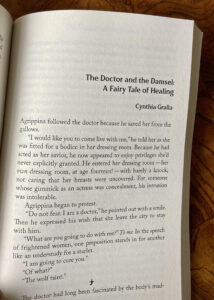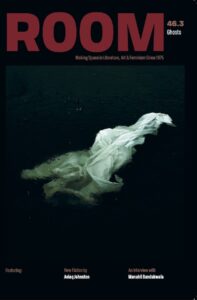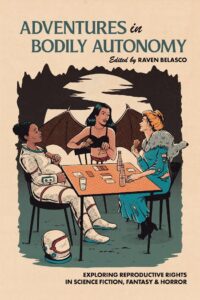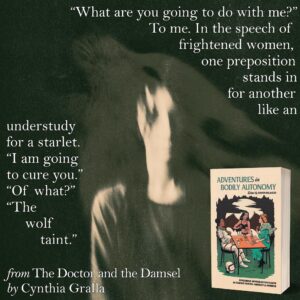Welcome! Here, I will be regularly posting short creative work, updates on new and upcoming publications, and other news and announcements.
I also have fiction and nonfiction published on other sites. Please find them here.

Welcome! Here, I will be regularly posting short creative work, updates on new and upcoming publications, and other news and announcements.
I also have fiction and nonfiction published on other sites. Please find them here.
Trigger warning: This episode talks about suicide. If you are having thoughts of suicide, call or text 988 to reach the 988 Suicide and Crisis Lifeline or go to SpeakingOfSuicide.com/resources for a list of additional resources.
Last July, my therapist told me that I sounded exhausted. I needed not just a few good nights’ sleep but an old-fashioned rest cure—without the toxic William Morris wallpaper. Also, it was high summer, which meant that I had to sequester myself in dusky rooms thanks to lupus and my vampiric photosensitivity. So I ended up spending time on Reddit.
For about a decade, LinkedIn had been the only social media site I frequented; anything owned by Mark Zuckerberg, I figured, was bound to induce nightmares. I’d signed up for a Reddit account but had never really used it. Yet a few days after my therapist’s prescription, it hit me: Reddit was cluttered with cats, along with bottomless discussions about books and fashion and cooking and Twin Peaks, some of my favorite things. I dove down the r/abbit hole.
Within the protective cloak of anonymity, I found that what was valued most by most people was wit, good sense, and kindness. In a highly partisan visual culture peopled by would-be influencers, that discovery was refreshing.

What better way to celebrate the year you turn 50 than to be chosen by Prairie Fire, one of Canada’s most prestigious magazines, for their 50 Canadian Writers Over 50 issue? (Over just by a few months, but still.) I’m honored and thrilled that my essay, “I’m Childless, Not Kinshipless,” will be featured in their fall 2024 print issue (45.3) this October.
For the first time this year, I looked forward to May’s Borderline Personality Disorder (BPD) Awareness Month. That’s because we’ve reached a crossroads that could lead to a revolution in how we conceptualize and care for BPD.
I once thought the stigma against BPD would kill me. When I fought BPD in the late 1990s and early 2000s, evidence-based treatments were just beginning to be widely disseminated. The few therapists and psychiatrists willing to work with me after hearing about my suicide attempts just doused me with medications indicated for other psychiatric conditions. I tried to kill myself eight times and turned to drugs to cope with surviving.
BPD afflicts 1.6% of the population, and common symptoms include unstable relationships, recurrent suicide attempts, and erratic moods. During my worst periods with the disorder, I whipsawed between euphoria and desolation. A therapist friend of mine described us as spinning tops that can be knocked over by a flower.

Kuma the Bengal traveled the world, but he preferred to be curled up at home with his human parents. He was born in South Florida, lived in Poland and Japan, and retired on Vancouver Island.

I’m happy to share that I have a short story — actually, three interlocked short stories — called “Nesting Boxes” in the upcoming print issue of The Antigonish Review. The story was inspired by Joseph Cornell’s Taglioni’s Jewel Casket, pictured above, and a delivery service for foraged edibles called the Wild Box.

Happy new year! I hope yours is filled with joy, well-being, compassion, and self-discovery.
This April, I will be launching an interview podcast called A Real Affliction: BPD, Culture, and Stigma. It will explore how we live with, treat, advocate for, write about, and conceptualize borderline personality disorder, as well as common co-occurring challenges like complex PTSD and substance use disorder, all of which I’ve experienced. My guests and I will also discuss how literature, film, television, art, philosophy, the history of medicine, feminist and disability studies, nature, and bioethics reflect, illuminate, and impact the experience and cultural perceptions of BPD. If you have experience or expertise that would fit the podcast’s focus and would like to be interviewed, please feel free to reach out to me at cynthiagrallabooks@gmail.com.
I read so many wonderful books this year, including new-for-me authors like Cao Xue, Tan Twan Eng, and Vanessa Onwuemezi as well as old favorites like Italo Calvino (The Castle of Crossed Destinies). I read books that I enjoyed and others that showed me something new, and some that did both. This list includes those that did both, but I understand that other readers might find some of my entries hard to love.
Fiction
The Book of Goose by Yiyun Li: Something about Li’s voice tends to grab me and not let go. This book has smart things to say about the harrowing intimacies of girls’ friendships and the absurdities of fame.
This Other Eden by Paul Harding: Harding writes gorgeous prose, including a boatload of muscular, one-syllable verbs: birl, shim, reeve. While some readers may not appreciate the perspective shift in the middle section nor the sense of glimpsing history down a long, dark tunnel, I loved it.

I’m excited to share that Ms. recommended Adventures in Bodily Autonomy, which is now on sale:

Congratulations to Ellis Amdur for winning first prize in the mainstream/literary fiction category for Writer’s Digest‘s self-published book awards! Little Bird and the Tiger is a historical novel about a real-life woman warrior in Meiji Japan. I was lucky enough to edit and blurb this searing novel, and I highly recommend it.
I occasionally take on book editing projects, so if you have one that you think I’d be a good match for, please contact me at cynthiagrallabooks@gmail.com.
A few months ago, I started using Reddit. At first it was to see what the online BPD community was like. But I was surprised to find a fairly positive social media site. So I signed up for subreddits related to cats, books, Twin Peaks, fashion, dance, cooking, lupus, and endometriosis. I have a gift for puns, which found appreciation on the cats sub in particular.
This morning, a woman on the cats sub asked, “If I leave a suicide note, will someone take care of my cat?”
I didn’t even read her entire post because I rushed to answer it. But I saw that she lived on the street with her disabled cat Kafka, that she’d tried to get a shelter to take him because she’d used her last money to feed him, that they wouldn’t accept him because he was disabled, that she had a history of being sexually abused.

My copy of Adventures in Bodily Autonomy arrived! It should be available for purchase on Amazon soon.
Theatrical. Teasing. Tantalizing. Tanda. Together. Timing. Turning. Twisting. Tableaux.
Argentinian. Ad-lib. Angsty. Arched. Angular. Artful. Ardent. Always-almost. Again.
Nevertheless. Nonchalance. Negotiation. Niceties. Noir.
Gallant. Gentle. Genteel. Gusto. Gancho. Graphic.
Oblique. Overacted. Offering. Orchestra. Ocho. Oh.
This will be an ongoing list, I fear.
Are the mood swings, suidical ideation, and depression I’m experiencing in perimenopause worsened by my biological penchant for mood dysregulation and my history of BPD? Why are there no peer-reviewed articles about perimenopause and/or menopause and BPD? Continue reading
I’m proud to be part of this anthology. Proceeds go to NARAL Pro-Choice America to support bodily autonomy.
https://www.publishersweekly.com/9781619762503

I’m thrilled that a creative nonfiction essay of mine will appear in the “Ghosts” issue of Room, Canada’s oldest feminist journal. (It’s almost as old as I am.) It will be available in bookstores and online in mid-September.
This piece is very important to me because in it, I write about Lara Gilbert, a woman who died by suicide at age 22. The University of Victoria houses her archives, including 3,200 pages of a trenchant, stunning, and heartbreaking diary. I spent months exploring it, and this essay responds to some of its implicit questions about memory and abuse. I’m especially excited that it will appear in Room as Lara’s mother, artist Carole Itter, has also published in the magazine.
I would be honored if you’d read it!
Unfortunately, the Facebook author page in my name is no longer under my control. It was an offshoot of my husband’s Facebook page, which was hacked a few days ago. So if, heaven forbid, Neo-Nazi propaganda starts to appear on my author Facebook page, it was not written by me. My LinkedIn profile is still mine.
Like the title says.
I’m currently experiencing depression. On the one hand, I’m lucky because I have time to devote to taking care of my mental health. I just finished a major revision of my memoir, I’m only teaching a six-person course at the moment, and my husband is ensuring that I eat and don’t have to worry about anything but myself right now. On the other hand, I recently lost my extended medical coverage when I was essentially laid off from the University of Victoria (which is one factor in my depression). Because of that loss, I had to stop working with my EMDR therapist, whom I liked very much but could no longer afford, and go on a waiting list for a low-cost counselor who does DBT; none of the low-cost counselors in my city offers EMDR. In the meantime, I’m trying to stay afloat with free Zoom support groups. This situation prompted this month’s post.
Over 75% of instructors at North American universities are now non-tenure-track. The majority of them are adjuncts (or sessionals, as they’re often called in Canada), hired part-time. What this means is that most people teaching college and university students do not have any mental health care coverage.


I am excited and proud to have a short story of mine in this anthology, whose proceeds will go to NARAL Pro-Choice America. I will add the press release soon. Pub date: October 16.
April 2023
Sabina Spielrein might be considered the patient zero of psychoanalysis. She was predated by several of Freud’s most famous subjects, including Dora, but Sabina’s story of saving and survival is complicated by her relationship with Carl Jung, who, as her doctor, treated her according to Freud’s methods and inspired her to become one of the first female psychoanalysts. She is also representative of a time when treatment for debilitating symptoms of mental illness was measured in months rather than years, although in a more general sense, recovery never truly ends.
Born to a wealthy Jewish family in Rostov-on-Don, a Russian port city near the Sea of Azov, Sabina was raised speaking Russian, German, French, and English. As a child Sabina granted herself a magical power she called partunskraft, which allowed her to know and obtain everything if only she desired it, but it would be a long time before she knew herself.
After several breakdowns, she was hospitalized in the progressive Burghölzli hospital in Zurich, Switzerland. There she was treated for hysteria by director Eugen Bleuler and Jung. (Bleuler is a wash—on the one hand, he coined the term schizophrenia and believed in livable conditions for mental patients; on the other, he advocated their sterilization based on eugenics.) In that it often affected materially privileged Caucasian women, hysteria was the anorexia of its day. Hysteria was not a new concept, but it was the height of fashion when Sabina was diagnosed with it. Its patients made distress visible through gestures, postures, and embodiment, like the silent screen actresses of their time. They were stars of somatization.
February 2023
I just started working on a new novel called The Mnemosynes. No: the truth is I dreamt of it for years. I only now started assembling its pieces with my fingertips.
I lived with this novel long enough for it to become memory before it mazed and runed rough pages.
But I still don’t understand memory. I’ve studied it in literature. I’ve felt its imprints, the just-slipping-into-sleep of it, during rushed hours. I know it’s married to time. After I explained the working plot of The Mnemosynes, in which plots run forward and backward and implode like stars, a friend remarked, “Since memory is what gives us our sense of time, I think it makes sense that memory might manipulate time somehow.”
Memories are—
Timbered, embered, antlered, torn.
Spring’s blossoms, summer’s haze, autumn’s turns, winter’s rage.
Less terraformed than dreams.
Hugged to one’s chest like a child’s legs, when feeling one’s heartbeat is enough.
Scanned and metered, and even when you smirk at the idea that everyone
stresses the same syllable, you still find their poetry.
Kintsugi-ed
Matryoshka-ed.
All the languages I didn’t let myself know.
The cool stream, ribboned and sheened, in which I dip my toes—but I am upside down.